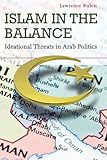Islam in the balance : ideational threats in Arab politics / Lawrence Rubin.
Material type: TextPublisher: Stanford, California : Stanford Security Studies, an imprint of Stanford University Press, [2014]Copyright date: ©2014Description: 1 online resource (ix, 189 pages) : illustrationsContent type:
TextPublisher: Stanford, California : Stanford Security Studies, an imprint of Stanford University Press, [2014]Copyright date: ©2014Description: 1 online resource (ix, 189 pages) : illustrationsContent type: - 9780804792103
- 0804792100
- Islam and politics -- Middle East
- National security -- Middle East
- Egypt -- Politics and government -- 1981-2011
- Saudi Arabia -- Politics and government -- 1982-
- Iran -- Foreign public opinion, Arab
- Sudan -- Foreign public opinion, Arab
- Middle East -- Foreign relations -- 1979-
- Middle East -- Politics and government -- 1979-
- Threat (Psychology) -- Political aspects -- Middle East
- International relations -- Psychological aspects
- Égypte -- Politique et gouvernement -- 1981-2011
- Arabie saoudite -- Politique et gouvernement -- 1982-
- Moyen-Orient -- Relations extérieures -- 1979-
- Moyen-Orient -- Politique et gouvernement -- 1979-
- Relations internationales -- Aspect psychologique
- POLITICAL SCIENCE -- Essays
- POLITICAL SCIENCE -- Government -- General
- POLITICAL SCIENCE -- Government -- National
- POLITICAL SCIENCE -- Reference
- POLITICAL SCIENCE -- Security (National & International)
- Diplomatic relations
- International relations -- Psychological aspects
- Islam and politics
- National security
- Politics and government
- Public opinion, Arab
- Egypt
- Iran
- Middle East
- Saudi Arabia
- Sudan
- Since 1979
- 320.55/70956 23
- BP173.7 .R82 2014eb
- online - EBSCO
| Item type | Current library | Call number | URL | Status | Notes | Barcode | |
|---|---|---|---|---|---|---|---|
 eBook
eBook
|
Biblioteca "Angelicum" Pont. Univ. S.Tommaso d'Aquino Nuvola online | online - EBSCO (Browse shelf(Opens below)) | Online access | Not for loan (Accesso limitato) | Accesso per gli utenti autorizzati / Access for authorized users | (ebsco)778903 |
Browsing Biblioteca "Angelicum" Pont. Univ. S.Tommaso d'Aquino shelves, Shelving location: Nuvola online Close shelf browser (Hides shelf browser)

|

|

|

|

|

|

|
||
| online - EBSCO Islam in its international context : comparative perspectives / | online - EBSCO Islam in "liberal" Europe : freedom, equality, and intolerance / | online - EBSCO Islam in post-Soviet Uzbekistan : the morality of experience / | online - EBSCO Islam in the balance : ideational threats in Arab politics / | online - EBSCO Islam on the move : the Tablighi Jama'at in Southeast Asia / | online - EBSCO Islam on the street : religion in modern Arabic literature / | online - EBSCO Islam's Jesus. |
Introduction -- The ideational security dilemma, ideational power, and ideational balancing -- Ideational projection after the Iranian Revolution -- The power of a weak state : Sudan's relations with Saudi Arabia and Egypt -- Indirect power projection and ideational balancing after Khomeni -- Conclusion : balancing the Brotherhood.
Includes bibliographical references (pages 165-176) and index.
Print version record.
This volume analyses how ideas, or political ideology, can threaten states and how states react to ideational threats. It examines the threat perception and policies of two Arab, Muslim majority states, Egypt and Saudi Arabia, in response to the rise and activities of two revolutionary 'Islamic states', established in Iran (1979) and Sudan (1989). The book has significant implications for international relations theory, including religion and international affairs, and engages important debates in comparative politics about authoritarianism and Islamic activism.


